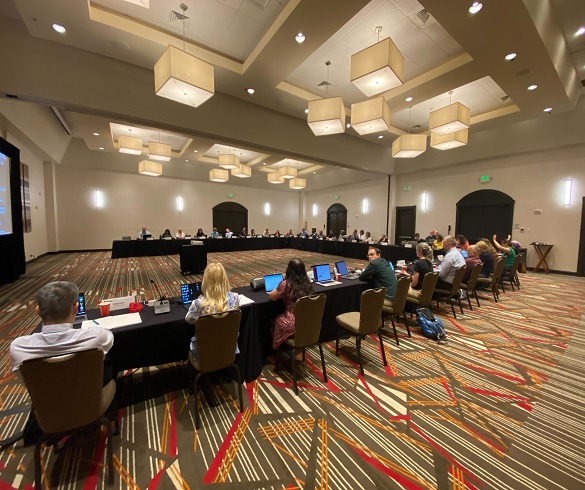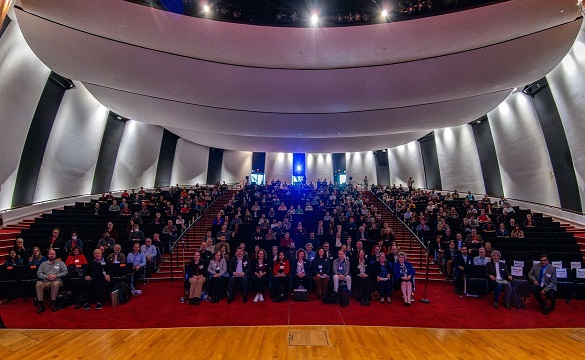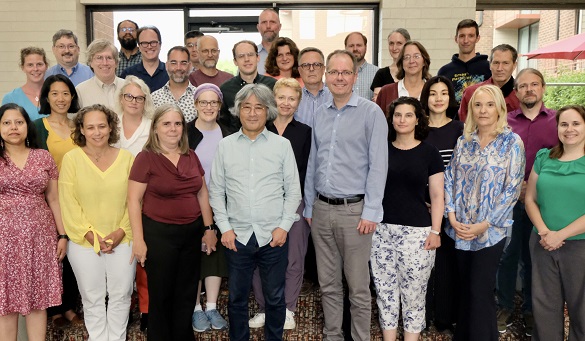
The P5 panel session in Denver
Christos Touramanis is Professor of Experimental Particle Physics with the University’s Department of Physics.
He is the first UK scientist, and one of only five non-US scientists, on the HEPAP Particle Physics Project Prioritization Panel that advises the US Government.
During 2023, Professor Touramanis travelled to the USA on numerous occasions as part of this role including a recent visit to Washington D.C where the Panel issued a report that made recommendations to U.S funding agencies for the research priorities for particle physics for the next ten years.
“Hamburg, Washington DC, Chicago in ten days. I spent most of December on planes and in meetings for the rollout of the US P5 report “Exploring the Quantum Universe: Pathways to Innovation and Discovery in Particle Physics.
The USA invests annually $1.2 billions in particle physics research, expected to rise to about $2 billions over the next ten years.
Last year the US Department of Energy (DoE) and National Science Foundation (NSF) set up the P5 panel to “develop an updated strategic plan for U.S. high-energy physics that can be executed over a 10-year timeframe in the context of a 20-year, globally aware strategy for the field”, an exercise repeated about every ten years.
Being the first UK-based scientist on a P5 was for me a privilege and a unique experience, and much hard work culminating in the recent acceptance of our report and its strong endorsement by the America Physical Society, Directors of US National Laboratories, and the wider community.
We received input from the earlier “Snowmass” community process, Town Hall meetings which we organised at Argonne, Berkeley, Brookhaven, Fermilab, SLAC and online, and direct communications from colleagues.
We then had three-day sessions in California, DC, Colorado and Texas, followed by weekly meetings which kept me up every Thursday midnight due to the time zone difference.
The 30-member panel discussions were long and went deep into the science, discovery potential, planning realism, estimated budgets, risks, international relevance and other aspects of each proposed project.
We had to take difficult decisions as the projects proposed added up to more than twice the expected budget in the most optimistic funding scenario considered.
That 30 scientists from theory, high energy colliders, neutrino and dark matter experiments, cosmology and accelerator physics achieved consensus and avoided voting on any matter was an impressive achievement.

The US particle physics community at Fermilab
What is particularly pleasing is that that our particle physics programme here at the University of Liverpool is so well aligned with what P5 recommended for the US progamme: the full exploitation of ATLAS and LHCb at the LHC at CERN and their HL-LHC upgrades; the first phase of DUNE at Fermilab and SURF; neutrino experiments SBND and T2K; dark matter experiments LZ and DarkSide-20k; and lepton flavour experiment Mu2e.
Liverpool Physics has delivered key instruments to each one of these international experiments and our staff hold leadership positions in their operation and scientific exploitation.
The muon g-2 experiment at Fermilab and ProtoDUNE at CERN, executed under the leadership of Liverpool co-spokespersons, are among the projects that the P5 report mentions as evidence of success of US particle physics in recent years.
More importantly our future plans also have maximal overlap: to build the second phase of DUNE; perform R&D and realise the FCC-ee Higgs Factory collider at CERN; build and operate a Generation 3 dark matter experiment; conduct accelerator and detector R&D towards the next highest energy collider which could be a muon collider in the USA or the FCC-hh at CERN.
The muon collider, “our muon shot” as we called it, provides a bold aim for the US community and could be realised three decades from now.
Being around to see that happen, with Liverpool participation, would make all the delayed flights and long night meetings well worth it!”

The P5 panel at Denver.